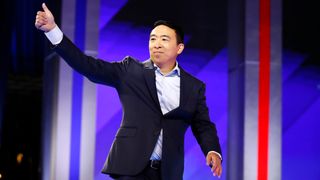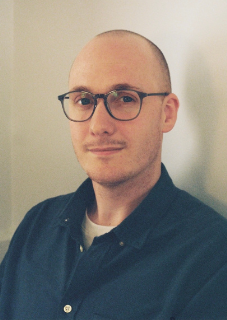New York businessman and entrepreneur Andrew Yang has sent shockwaves through the political world in his unconventional bid to win the Democratic Presidential nomination.
In what was supposed to be a long-shot campaign, Yang has secured relatively strong polling figures, booming fundraising numbers and a dedicated base of niche supporters whose overriding connection to each other is the fact that they discovered Yang online.
Yang's campaign has drawn on elements of both Trump and Bernie Sanders' 2016 campaigns. Like Trump, he comes from well outside the realm of politics and purports to be bringing a business sensibility to the top office. His campaign, though, is ideas-driven and its main vehicle, the Freedom Dividend, is not dissimilar in scale and ambition to the Democratic Socialism that Bernie deployed to rock the Democratic establishment back in 2016.
The dividend is Yang’s revamped take on universal basic income, a recurring payment, independent of employment and without discretionary spending restrictions. Yang promises to provide $1,000 per month to every American over the age of 18, guaranteeing them a form of social security and encouraging them to inject money back into the economy. It is a crucial solution, he argues, to the existential threat that artificial intelligence poses to the American working class.
Perhaps the best measure of the rise of Andrew Yang is where he stood on the Democratic Debate platform last month: off the left shoulder of Elizabeth Warren, between Pete Buttigieg and Beto O’Rourke: a position directly comparable to Kamala Harris’, to the right of Joe Biden and Bernie Sanders.
In a field with two clear favourites (Biden and Warren), Yang finds himself firmly in the second tier. This is a tier former presidents Clinton, Obama and Carter could have counted themselves among in the leadup to their respective election years.
But Yang’s challenge is larger than those past. To pull off a momentum-grabbing result early in the primary voting process, Andrew Yang will have to master a crucial element of American elections that has thus far eluded him: Geography.
Traditionally, success in the early polling states is an essential stepping stone in the race to secure the Democratic Party’s nomination for President. Iowa and New Hampshire are signal boosters. They provide the first indications of a candidate’s viability and capture the attention of the nation’s press. A good result in either of these states can propel a presidential hopeful into the consciousness of both voters and pundits.
To pull off a momentum-grabbing result early in the primary voting process, Andrew Yang will have to master a crucial element of American elections that has thus far eluded him: Geography.
If a candidate misses crucial early stepping stones in the primary process, the leap to success at the Super Tuesday primaries is almost unconquerable.
And this is where the trouble lays for Andrew Yang.
Yang’s unique cohort of supporters, coined the ‘Yang Gang’, is chiefly made up of young males who spend a good deal of time online. Yang has tweeted more than any other candidate - often deploying humour - and has continuously been one of the most googled candidates following Democratic debates.
Primarily online support isn’t the only unconventional characteristic of Yang supporters. They represent a wide variety of stances on the political spectrum, ranging from progressive democrats to 2016 Trump voters.
In a lot of states, this means Yang supporters will have to first register as Democrats, and then go out and vote in the primaries. If they live in a caucus state like Iowa, they will have to attend the full hours-long event in person.
But even granting the sheer confidence that these unlikely voters will cast primary ballots, Yang’s elemental campaign is highly unlikely to secure the Democratic presidential nomination.
It’s not an impossible task to conquer. Mobilising unlikely voters is a tried-and-tested method of pulling an electoral rabbit out of the hat in American politics but Yang lacks the hat.
Conventional Democrats like Joe Biden have traditional voters on their side while Elizabeth Warren has vote mobilising experience from her Senate runs and is drawing in many of the unlikely voters that Bernie Sanders did the heavy-lifting for in 2016. These three already had strong name recognition prior to the race. This leaves only the least likely voters. Yang has to get their attention and then their support before he can get their votes.
Mobilising unlikely voters is a tried-and-tested method of pulling an electoral rabbit out of the hat in American politics but Yang lacks the hat.
Despite his campaign’s sheer confidence that it can do this, Yang’s fervent supporters are at this stage too geographically dispersed across the US to help him win substantial state votes in the primary process.
The Yang campaign is not blind to this edge of its challenge and has been increasingly shifting to sell the Freedom Dividend as a method of compensating the work of stay-at-home mothers.
This is a better strategy to address the geography in his campaign, but with the strongest ever contingent of women candidates in a US primary field - Yang is up against opponents that have a much simpler claim to understanding the issues of women in the United States.
None of this is to say that the Yang campaign is dead.
Just think back to that Democratic stage and Andrew Yang’s position on it. While the actual process of securing the nomination relies on geography, securing a place on the debate stage relies on nation-wide measures of polling and unique donor numbers - areas that suit Andrew Yang just fine.
Even without a place on the debate stages or states under his belt, there's no reason for Yang to drop out of the race. Unlike stalwart Democrats like Amy Klobuchar or Cory Booker, Yang won’t be faced with the career-threatening prospect of irking the Democratic establishment by staying in the race when the odds of success have waned beyond the threshold of impossibility. This means that his out of the box ideas will be in the party’s discourse at least until the Democratic National Convention in July 2020.
Ideas lingering in the ranks of a Democratic Party that is still finding its feet after the 2016 election could have the inertia to well-outlast the candidacy of Yang. Like Sanders' Democratic Socialism, Yang's Freedom Dividend and artificial intelligence alarmism could yet shape the party for years to come - with or without him.







